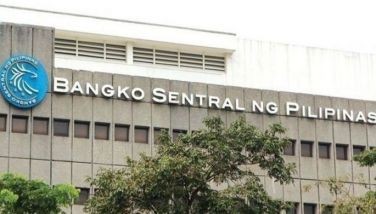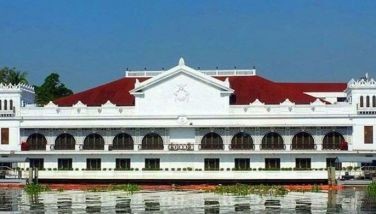PNOC-EDC questions award of PGI drilling contract to Desco
May 23, 2002 | 12:00am
State-owned PNOC-Energy Development Corp. (PNOC-EDC), the geothermal unit of the Philippine National Oil Co. (PNOC), is contesting the Philippine Geothermal Inc. (PGI)’s decision to award a $12-million drilling contract to Desco.
"In a meeting with PGI management last week, EDC had already raised serious concerns over the bidding evaluation process. We felt PGI was particularly vague about its specs and point system," EDC president Sergio Apostol said yesterday.
PGI announced early this week that it has awarded the drilling contract for three wells to a Filipino-owned drilling corporation, Desco.
Apostol, however, argued that there is apparently some kind of misrepresentation on the part of Desco.
"It is noteworthy to point out that the contract was awarded to Century Drilling, an Australian firm and not an all-Filipino company as PGI claims. Desco, which is owned by a British national, is merely the coordinating agency for Century Drilling. Desco does not own nor operate the kind of drilling rig that PGI’s tender documents specified," Apostol said.
The EDC executive said PGI has been unfair in its evaluation. "It is our belief that PGI, as a government contractor for power generation, should also be bound by the same standards of transparency, fairness and public accountability for its transactions," he said.
He said the company’s track record could speak of its exemplary performance. "Given our proven, we would like to reiterate that EDC’s bid was $623,725 (or about P31 million) lower than that of the company which was awarded the contract," he said.
He noted that the EDC’s bid was $3.65 million compared to Desco’s $4.277 million. "This sum is a huge differential considering that Napocor and not PGI will ultimately pay for this drilling contract. The consumers will eventually shoulder this cost," he added.
The move of PGI, Apostol said, might jeopardize EDC’s reputation. "In the interest of protecting our reputation as a global provider of drilling services, EDC would like to clarify certain points," he said.
In a letter to PGI president Stephen Pye, Apostol pointed out that EDC owns and operates nine rigs and has been in the business of drilling geothermal wells for almost three decades.
PGI also accounted for at least 23 percent of the total 765 wells drilled by the EDC since 1974.
He also said that EDC had drilled wells at a depth ranging from 5,000 to 18,360 feet, contrary to what PGI claims that EDC did not pass the right test for digging deeper wells.
"PGI’s 13,000-ft depth requirement is therefore not new to EDC. EDC, in fact, offered a 2000 horsepower electric rig with a drilling capacity of 20,000 ft for this bidding contract," he said.
For the Makban and Tiwi fields that are managed by PGI, EDC has drilled 176 wells at costs of $1.5 to $2 million per well. The drilling contract awarded to Desco amounted to $4 million per well.
According to Apostol, EDC inputted all instrumentation that PGI required. "The technology and equipment via PED (pressure while drilling) and MWD (measurement while drilling) processes that were required are no longer new technology as PGI claims, and can either be purchased or contracted out to third parties," he said.
Last year, he said EDC’s safety record was a 3.7 lost time incident frequency rate, which is significantly lower than the industry standard of 4.83 and the Asia-Pacific average of 3.89.
"The same strict safety and technical standards are followed in all our other drilling contracts. At the moment, we are undertaking our third contract in Papua New Guinea where we have been drilling for the past three years," he said.
Apostol also questioned the funding for the project which PGI claimed would be financed by National Power Corp. (Napocor), (55 percent) and PGI (45 percent). PGI, a contractor of Napocor in the Tiwi-Makban geothermal plants, conducted private bidding for the drilling of the deeper wells.
"PGI may claim that it is not paid by Napocor and spends its own money for its activities. We beg to disagree. PGI is eventually paid by the Philippine Government with government funds. Hence, PGI should well consider that it could be held accountable not only to it stockholders but also to the Philippine government as well," Apostol said.
"In a meeting with PGI management last week, EDC had already raised serious concerns over the bidding evaluation process. We felt PGI was particularly vague about its specs and point system," EDC president Sergio Apostol said yesterday.
PGI announced early this week that it has awarded the drilling contract for three wells to a Filipino-owned drilling corporation, Desco.
Apostol, however, argued that there is apparently some kind of misrepresentation on the part of Desco.
"It is noteworthy to point out that the contract was awarded to Century Drilling, an Australian firm and not an all-Filipino company as PGI claims. Desco, which is owned by a British national, is merely the coordinating agency for Century Drilling. Desco does not own nor operate the kind of drilling rig that PGI’s tender documents specified," Apostol said.
The EDC executive said PGI has been unfair in its evaluation. "It is our belief that PGI, as a government contractor for power generation, should also be bound by the same standards of transparency, fairness and public accountability for its transactions," he said.
He said the company’s track record could speak of its exemplary performance. "Given our proven, we would like to reiterate that EDC’s bid was $623,725 (or about P31 million) lower than that of the company which was awarded the contract," he said.
He noted that the EDC’s bid was $3.65 million compared to Desco’s $4.277 million. "This sum is a huge differential considering that Napocor and not PGI will ultimately pay for this drilling contract. The consumers will eventually shoulder this cost," he added.
The move of PGI, Apostol said, might jeopardize EDC’s reputation. "In the interest of protecting our reputation as a global provider of drilling services, EDC would like to clarify certain points," he said.
In a letter to PGI president Stephen Pye, Apostol pointed out that EDC owns and operates nine rigs and has been in the business of drilling geothermal wells for almost three decades.
PGI also accounted for at least 23 percent of the total 765 wells drilled by the EDC since 1974.
He also said that EDC had drilled wells at a depth ranging from 5,000 to 18,360 feet, contrary to what PGI claims that EDC did not pass the right test for digging deeper wells.
"PGI’s 13,000-ft depth requirement is therefore not new to EDC. EDC, in fact, offered a 2000 horsepower electric rig with a drilling capacity of 20,000 ft for this bidding contract," he said.
For the Makban and Tiwi fields that are managed by PGI, EDC has drilled 176 wells at costs of $1.5 to $2 million per well. The drilling contract awarded to Desco amounted to $4 million per well.
According to Apostol, EDC inputted all instrumentation that PGI required. "The technology and equipment via PED (pressure while drilling) and MWD (measurement while drilling) processes that were required are no longer new technology as PGI claims, and can either be purchased or contracted out to third parties," he said.
Last year, he said EDC’s safety record was a 3.7 lost time incident frequency rate, which is significantly lower than the industry standard of 4.83 and the Asia-Pacific average of 3.89.
"The same strict safety and technical standards are followed in all our other drilling contracts. At the moment, we are undertaking our third contract in Papua New Guinea where we have been drilling for the past three years," he said.
Apostol also questioned the funding for the project which PGI claimed would be financed by National Power Corp. (Napocor), (55 percent) and PGI (45 percent). PGI, a contractor of Napocor in the Tiwi-Makban geothermal plants, conducted private bidding for the drilling of the deeper wells.
"PGI may claim that it is not paid by Napocor and spends its own money for its activities. We beg to disagree. PGI is eventually paid by the Philippine Government with government funds. Hence, PGI should well consider that it could be held accountable not only to it stockholders but also to the Philippine government as well," Apostol said.
BrandSpace Articles
<
>
- Latest
- Trending
Trending
Latest
Trending
Latest
Recommended





























